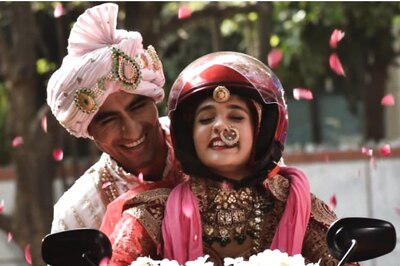
views
RSS sarsanghchalak Mohan Rao Bhagwat's combative avatar at Nagpur on Thursday was in stark contrast to his benign persona at Vigyan Bhawan last month. In his most political speech yet, Bhagwat all but demanded an Ordinance enabling a Ram Temple at Ayodhya, condemned the Opposition for its “power politics” and the judiciary for poorly thought-out interventions.
He directly addressed the impending Lok Sabha elections and inadvertently acknowledged the BJP's electoral soft spots. The play on nationalist sentiment was twofold: on the one hand, whipping up a fear factor vis-à-vis threats to national security and, on the other, appealing to majoritarian sentiment on the Ram Janmabhoomi issue.
The sarsanghchalak's annual Vijayadashami speech is a sort of the state of the union address aimed at swayamsewaks across the country. In Delhi, he was speaking to the intelligentsia but in Nagpur, he was addressing the cadre and so, the gloves were off. This year's message was loud and clear: set aside your grievances against the government and put your heart and soul into ensuring the BJP's re-election.
Voters “will have to rise above self, parochial feelings, petty egos of caste, language and provincial affiliations, keeping in mind that the national interest is supreme”, so that the result does not lead to “repentance”, he declared.
Bhagwat is well aware of the angst among the upper castes on the SC/ST Act amendment (which was aimed at overturning a Supreme Court judgment curbing misuse of the law). Hardcore BJP supporters have openly declared that while they cannot vote for the Congress, they will punish the BJP by opting for NOTA (none of the above).
The sarsanghchalak warned that such non-voting would favour “the most ineffective (read Congress)” candidates. He did a balancing act between interest groups, by appealing for greater efficiency and sensitivity in executing schemes for Scheduled Castes and Scheduled tribes.
In a tangential reference to the controversial Rafale deal, he observed that efforts were being made to “enhance the morale of our armed and security forces” with the latest technologies, thereby boosting the country's prestige globally. He called for “total self-reliance” in defence production, with multilateral exchanges if necessary. That's the angle swayamsewaks are expected to pitch to voters.
The RSS stand on “constructing a magnificent Ram Temple” has been consistent, but the new-found aggression is an obvious attempt to encash it electorally, yet again. Describing the temple as necessary for self-esteem, he warned naysayers not to “test the patience of society” by trying to stall the temple through judicial chicanery.
Throwing political correctness (which was on display at Vigyan Bhawan) to the winds, he took a populist stand on the SC's Sabarimala ruling, condemning it for allowing women of all ages to visit the shrine. He described the ruling as a “brazen onslaught on (Hindu) symbols of faith”, which had led to “unrest, turmoil and divisiveness”.
He attempted to 'blackwash' the Opposition with a vitriolic barrage against “selfish power-hungry politics... with an eye on votes in the upcoming elections”. In supporting “urban Naxalism” and its “Neo-Left” doctrine, it was undermining internal security, backing “treasonous activity” and lending itself to “a world of psychological warfare” or ‘Mantrayudhh’. The BJP's votebank politics naturally did not figure.
He presented a surprisingly detailed picture of Naxal networks and national security concerns, which are expected to feature prominently in the BJP's election campaign for 2019.
Bhagwat took over from KS Sudarshan in 2009 and is regarded as perhaps the most political sarsanghchalak ever. The tensions between the RSS and the BJP which marked NDA-I have been absent in NDA-II. The cadre may complain from time to time, but the coordination between the top echelon of government and the RSS has been relatively frictionless, greased by the presence of more than 30 full-time Sangh workers in the party.
That has not stopped RSS frontal organisations from severely criticising the Modi regime from time to time, particularly on farmers' issues and FDI. But during his speech at the Pratinidhi Sabha earlier this year, Bhagwat reserved his criticism for the bureaucracy (whom he described as shukracharyas) and made it clear that the incumbent regime was conducive to the growth of the RSS.
The Vijayadashami speech should put to rest rumours of a change in leadership and doubts about the pro-active role of the Sangh in the 2019 elections. From Rafale to the Ram Temple, the RSS has all the answers.
(The author is a senior journalist. Views are personal)


















Comments
0 comment